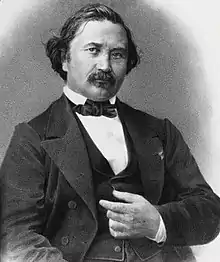Joseph Bertrand
Joseph Louis François Bertrand (11 March 1822 – 5 April 1900) was a French mathematician who worked in the fields of number theory, differential geometry, probability theory, economics and thermodynamics.[1]
Joseph Louis François Bertrand | |
|---|---|
 | |
| Born | 11 March 1822 |
| Died | 5 April 1900 (aged 78) Paris, France |
| Scientific career | |
| Fields | Mathematics |
Biography
Bertrand was a professor at the École Polytechnique and Collège de France. He was a member of the Paris Academy of Sciences and was its permanent secretary for twenty-six years. He was the son of physician Alexandre Jacques François Bertrand and the brother of archaeologist Alexandre Bertrand. His father died when Joseph was only nine years old, but that did not stand in his way of learning and understanding algebraic and elementary geometric concepts, and he also could speak Latin fluently, all when he was of the same age of nine. At eleven years old he attended the course of the École Polytechnique as an auditor (open courses). From age eleven to seventeen, he obtained two bachelor's degrees, a license and a PhD with a thesis on the mathematical theory of electricity and is admitted first to the 1839 entrance examination of the École Polytechnique.
He conjectured, in 1845, that there is at least one prime between n and 2n − 2 for every n > 3. Chebyshev proved this conjecture, now called Bertrand's postulate, in 1850. He was also famous for a paradox in the field of probability, now known as Bertrand's Paradox. There is another paradox in game theory that is named after him, called the Bertrand Paradox. In 1849, he was the first to define real numbers using what is now called a Dedekind cut.[2][3]
Bertrand translated into French Carl Friedrich Gauss's work on the theory of errors and the method of least squares.
In the field of economics he reviewed the work on oligopoly theory, specifically the Cournot Competition Model (1838) of French mathematician Antoine Augustin Cournot. His Bertrand Competition Model (1883) argued that Cournot had reached a very misleading conclusion, and he reworked it using prices rather than quantities as the strategic variables, thus showing that the equilibrium price was simply the competitive price.
His book Thermodynamique points out in Chapter XII, that thermodynamic entropy and temperature are only defined for reversible processes. He was one of the first people to point this out.
In 1858 he was elected a foreign member of the Royal Swedish Academy of Sciences.
Works by Bertrand
- Traité de calcul différentiel et de calcul intégral (Paris : Gauthier-Villars, 1864–1870) (2 volumes treatise on calculus)
- Rapport sur les progrès les plus récents de l'analyse mathématique (Paris: Imprimerie Impériale, 1867) (report on recent progress in mathematical analysis)
- Traité d'arithmétique (L. Hachette, 1849) (arithmetics)
- Thermodynamique (Paris : Gauthier-Villars, 1887)
- Méthode des moindres carrés (Mallet-Bachelier, 1855) (translation of Gauss's work on least squares)
- Leçons sur la théorie mathématique de l'électricité / professées au Collège de France (Paris : Gauthier-Villars et fils, 1890)
- Calcul des probabilités (Paris : Gauthier-Villars et fils, 1889)[4]
- Arago et sa vie scientifique (Paris : J. Hetzel, 1865) (biography of Arago)
- Blaise Pascal (Paris : C. Lévy, 1891) (biography)
- Les fondateurs de l'astronomie moderne: Copernic, Tycho Brahé, Képler, Galilée, Newton (Paris: J. Hetzel, 1865) (biographies)
See also
Further reading
- Struik, D.J. (1970–1980). "Bertrand, Joseph Louis Francois". Dictionary of Scientific Biography. 2. New York: Charles Scribner's Sons. pp. 87–89. ISBN 978-0-684-10114-9.
References
- Éloge historique de Joseph Bertrand par Gaston Darboux (1902)
- Bertrand, Joseph (1849). Trait'e d'Arithmetique. page 203.
An incommensurable number can be defined only by indicating how the magnitude it expresses can be formed by means of unity. In what follows, we suppose that this definition consists of indicating which are the commensurable numbers smaller or larger than it ....
- Spalt, Detlef (2019). Eine kurze Geschichte der Analysis. Springer. doi:10.1007/978-3-662-57816-2. ISBN 978-3-662-57815-5.
- Davis, Ellery W. (1891). "Review: Calcul des Probabilités, par J. Bertrand" (PDF). Bull. Amer. Math. Soc. 1 (1): 16–25. doi:10.1090/s0002-9904-1891-00020-6.
External links
| Wikimedia Commons has media related to Joseph Bertrand. |